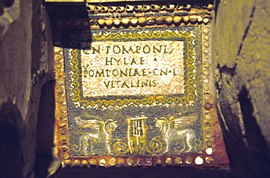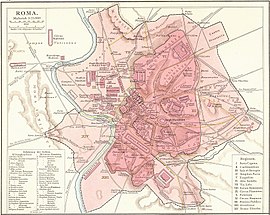Columbarium of Pomponius Hylas
 Mosaic panel at entrance to columbarium of Pomponius Hylas on via di Porta Latina. | |
 Click on the map for a fullscreen view | |
| Coordinates | 41°52′34″N 12°29′56″E / 41.87611°N 12.49889°E |
|---|---|
The Columbarium of Pomponius Hylas is a 1st-century CE Roman columbarium, situated near the Porta Latina on the Via di Porta Latina, Rome, Italy. It was discovered and excavated in 1831 by Pietro Campana.
Though its name derives from Pomponius Hylas, who lived during the Flavian period (69–96 CE), the building itself has been dated to between 14 and 54 CE due to inscriptions on two of its niches (one dedicated to a freedman of Tiberius and the other to a freedman of Claudia Octavia, daughter of Claudius and Messalina). It was later bought by Pomponius Hylas for himself and his wife, and he added the mosaic panel over the entrance steps, which is decorated with griffins and reads:
CN(aei) POMPONI HYLAE E(t) POMPONIAE CN(aei) L(ibertae) VITALINIS[1]
(Of Gnaeus Pomponius Hylas and Pomponia Vitalinis the freedwoman of Gnaeus)
The inscription also has a V (meaning vivit) over Pomponia's name, showing she was alive when the panel was added.
References and citations
Further reading
- Nash, Ernest. Pictorial Dictionary of Ancient Rome. London: A. Zwemmer, 1962.
Sources
- Nerone april 1996: The Columbarium of Hylas "
- JSTOR: Proposta per una Classificazione del Terzo Stile Pompeiano
External links
- Lucentini, M. (31 December 2012). The Rome Guide: Step by Step through History's Greatest City. Interlink. ISBN 9781623710088.
![]() Media related to Columbarium of Pomponius Hylas at Wikimedia Commons
Media related to Columbarium of Pomponius Hylas at Wikimedia Commons
| Preceded by Catacombs of San Sebastiano |
Landmarks of Rome Columbarium of Pomponius Hylas |
Succeeded by Mausoleum of Augustus |


